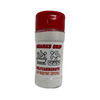SHARKGRIP Tub & Tile Coatings
Denticle anti-slip Crystals
- SKU:
- TG16
- MPN:
- TG16
- Condition:
- New
- Availability:
- Usually Ships the Same Day
- Weight:
- 1.00 LBS
- Shipping:
- $10.50 (Fixed Shipping Cost)
Description
Denticle Crystals are virtually invisible non-slip traction additive for paints, sealers and coatings. Denticle Crystals adds needed texture to coated surfaces to increase safety and reduce slip and fall accidents, especially when wet. Adding Denticle Crystals to sealers and coatings will also help to hide minor surface imperfections, by adding a slight texture and reducing surface reflection.
What sets this specialized polycarbonate crystals apart from other non-slip additives is it's durability and optical clarity. When suspended in a clear coating, the particles become virtually invisible and will not distort or discolor patterns or graphics. It is also extremely durable and chemical resistant.
The addition of Denticle Crystals to a coating can easily increase the abrasion resistance of that surface by up to 50%. Denticle Crystals is resistant to most acids, alkalis, solvents, grease, oil, gasoline, jet fuels, hydraulic fluids, detergents and alcohol. These qualities explain why this is the texturing agent used on the decks of ships and aircraft carriers around the world.
Polycarbonate -vs- Polypropylene
These are the two main types of polymer additives you will find on the market today. Although both will accomplish the task of creating texture on the surface of your coating, we have found the polycarbonates to be far superior.
Optical Clarity - Polycarbonates are almost crystal clear when suspended in a clear coating. Polypropylene doesn't transmit light as efficiently, giving it a slight milky, hazy, opaque appearance. This can distort and diminish the color of stains, dyes, graphics or any other surface being clear coated.
Durability - Polycarbonates are harder, more durable, more chemical resistant and longer lasting than polypropylenes. What good is a non-slip texture if it wears away?
Density - Polycarbonates are slightly heavier than polypropylenes... Wait, isn't their ultra light weight one of the advertised benefits of polypropylenes? Although the fact that polypropylenes will suspend or even float in some coatings, making the mixing and application process marginally easier for inexperienced applicators, our testing has shown that overall it really isn't a benefit at all.
When particles are suspended in a coating, the coating itself must support all the weight of the traffic, vehicles, furniture, equipment, etc. being applied to those particles that extend above the surface to create the desired texture. This stress can cause micro-cracks and premature failure of the coating itself. Polycarbonates are just slightly heavier, which allows them to settle and rest on the weight bearing substrate below.
This allows the weight of traffic to be transmitted directly to the substrate rather than to the coating itself, resulting in a stronger flooring system. This is the same principle behind heavy-duty commercial quartz floors where the quartz sand provides exceptional compressive strength.
Be sure to choose the texture size that is right for your specific project. Although "grit" size and "mesh" size are not exactly the same thing, you can get a rough idea of particle size by comparing the textures of 40 and 60 grit sheets of sandpaper. But... remember that unlike the particles on your sandpaper, these particles will be embedded in a coating. The type and thickness of the coating you choose, along with the amount of grip you add, will greatly affect the final texture. Doing a small test area with the actual coating you plan to use is the only way to determine exactly how aggressive the final texture will be on your particular surface.
40 Mesh - Aggressive texture for heavy foot traffic, docks and commercial kitchens. 40 Mesh is also a popular choice for use in thick 100% solids products since it is large enough to not be completely consumed by the thickness of the coating.
60 Mesh - Perfect for barefoot traffic, garage floors, pool decks, patios and shower stalls. 60 Mesh is by far our most popular size and works well in most 25% - 90% solids sealers and coatings.
Average typical loading is approximately 2/3 cup per gallon of sealer, but more or less can be used, depending on desired texture and number of coats to be applied.
Just for reference: Each pound of grip will typically load approximately 5 gallons of sealer at the average rate of 2/3 cup per gallon. Please note that this will obviously vary depending on the mesh size chosen and how tightly you pack the product into your measuring device.









